In the February edition of Journal Club, we talked about the new publication by Dr. Maria Blasco which demonstrates the reversal of pulmonary fibrosis in a new mouse model. This is an important step forward for the potential treatment of fibrosis as currently there are no effective cures for this disease.
We also wrote an article about this research if you would like to read a bit more about the background and the experiment.
Reference
Povedano, J. M., Martinez, P., Serrano, R., Tejera, Á., Gómez-López, G., Bobadilla, M., … & Blasco, M. A. (2018). Therapeutic effects of telomerase in mice with pulmonary fibrosis induced by damage to the lungs and short telomeres. eLife, 7, e31299.

Oliver Medvedik, Co-founder of
Genspace citizen science laboratory in Brooklyn NY, earned his Ph.D. at Harvard Medical School in the Biomedical and Biological Sciences program. As part of his doctoral work he has used single-celled budding yeast as a model system to map the genetic pathways that underlie the processes of aging in more complex organisms, such as humans.
Prior to arriving in Boston for his doctoral studies, he has lived most of his life in New York City. He obtained his bachelor’s degree in biology from Hunter College, City University of New York. Since graduating from Harvard, he has worked as a biotechnology consultant, taught molecular biology to numerous undergraduates at Harvard University and mentored two of Harvard’s teams for the international genetically engineered machines competition (IGEM) held annually at M.I.T.
Oliver is also the Director of
The Maurice Kanbar Center for Biomedical Engineering at the Cooper Union, New York City. The Maurice Kanbar Center for Biomedical Engineering is open to all Cooper Union faculty and students working on bioengineering projects requiring equipment and space for tissue culture, genetic engineering, biomechanics, and related research. Faculty that is currently using the facility are pursuing groundbreaking biomedical research in such fields as biomedical devices, tissue engineering, obstructive sleep apnea biomechanics also collaborating with several major New York City-based hospitals. The Kanbar Center continues to provide space for undergraduate teams participating in the international genetically engineered competition (iGEM) during the summer, as well as space for courses that offer a biological laboratory component.


